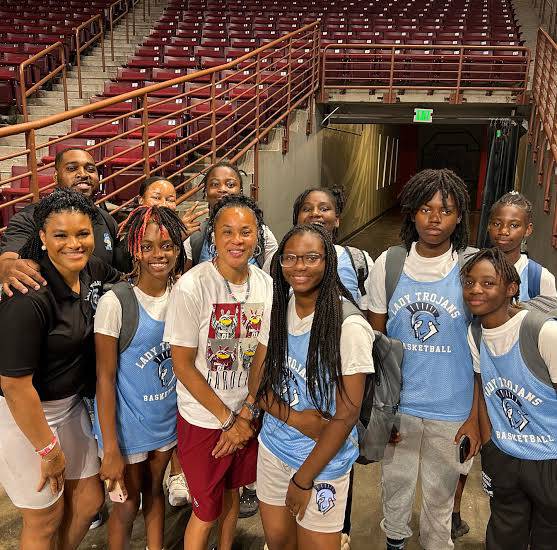
Dawn Staley’s Legacy: A Trailblazer on and off the Court
In an era where sports figures are often seen merely as athletes, Dawn Staley stands out as an exceptional role model who has shown that one’s influence can extend far beyond the playing field. Recently, Staley, the head coach of the University of South Carolina Gamecocks women’s basketball team, received a prestigious honor – The Secretary’s Award for Public-Philanthropic Partnerships from the U.S. Department of Housing and Urban Development (HUD). This award is given to individuals who have made exceptional contributions to their communities through public-private partnerships, bringing together the resources of the public sector with those of non-profit organizations to improve lives and create opportunities for underrepresented communities.
Staley’s career has long been defined by her leadership, both as a player and coach, but it is her work in the community that has truly set her apart. This award is not merely a reflection of her accomplishments in sports, but a recognition of her continued dedication to making meaningful change in the lives of individuals, especially those from underprivileged communities. This essay will delve into Staley’s career, the significance of the award, and the ways in which her contributions embody the spirit of philanthropy and public-private collaboration.
Dawn Staley’s Basketball Career: From Player to Coach
Before becoming one of the most respected coaches in NCAA basketball, Dawn Staley’s athletic career as a player laid the foundation for her influence in the sport. A native of Philadelphia, Staley was an All-American point guard at the University of Virginia, where she helped lead the Cavaliers to three Final Fours and earned numerous individual honors. Her performance on the court earned her a spot on the U.S. Women’s National Basketball Team, with which she competed in the Olympics. Staley’s achievements as a player were legendary, and she was inducted into the Naismith Memorial Basketball Hall of Fame in 2013.
After retiring from professional play, Staley transitioned into coaching, where her leadership ability would shine even brighter. She became the head coach at Temple University in 2000, where she quickly transformed the program into a national contender. Under her leadership, Temple achieved consistent success, including several NCAA tournament appearances and a reputation for tough, disciplined basketball.
In 2008, Staley took on a new challenge when she became the head coach of the University of South Carolina’s women’s basketball team. Staley’s impact on the Gamecocks has been profound. She turned a team with limited resources and no prior national recognition into one of the most successful programs in the country. Under Staley’s guidance, South Carolina became a powerhouse in women’s college basketball, winning multiple SEC championships and making several Final Four appearances. In 2017, Staley led the Gamecocks to their first NCAA Women’s Basketball National Championship, cementing her place among the elite coaches in the history of the sport.
While her success as a coach is remarkable, it is her commitment to empowering others and using her platform to create positive change that truly sets her apart.
Dawn Staley: A Champion for Social Change
Staley’s journey from player to coach has always been intertwined with her desire to give back to her community. She has used her platform to advocate for social justice, equality, and community development. Staley has consistently demonstrated a commitment to improving the lives of underrepresented individuals, especially young women and children. Her activism and philanthropic efforts have focused on providing access to education, healthcare, and safe living environments for those in need.
Staley’s philanthropic work often focuses on the intersection of sports and social justice. She has been an outspoken advocate for racial equality, using her voice to address issues related to police brutality, economic inequality, and systemic racism. Her advocacy was particularly notable during the Black Lives Matter movement, where she publicly supported the movement and used her position in the sports world to bring attention to these important issues.
One of the cornerstones of Staley’s charitable efforts is her work with the Dawn Staley Foundation, which was founded to support the growth and development of young people through sports, education, and mentorship. The foundation’s initiatives aim to provide children with the tools they need to succeed, both academically and athletically. By creating programs that support young people from disadvantaged backgrounds, Staley is helping to build a brighter future for individuals who may not otherwise have access to the resources that are so often taken for granted.
Her philanthropic work also includes support for affordable housing and community development, areas where the partnership between public and private sectors is especially crucial. This is where Staley’s recognition with the Secretary’s Award from HUD becomes significant.
The Secretary’s Award for Public-Philanthropic Partnerships
The Secretary’s Award for Public-Philanthropic Partnerships is an esteemed honor given by the U.S. Department of Housing and Urban Development (HUD) to individuals who have demonstrated outstanding leadership in fostering collaborations between the public and private sectors. The award acknowledges those who use their platforms and resources to bridge the gap between governmental entities and philanthropic organizations, working to improve the well-being of underserved communities.
This award recognizes the power of collaboration between the government and non-profit sectors to address pressing issues such as affordable housing, community development, and access to vital services. The Secretary’s Award celebrates individuals whose work exemplifies a commitment to building partnerships that lead to lasting, meaningful change.
In Staley’s case, this recognition is a testament to her longstanding commitment to creating opportunities for underprivileged individuals. Her work is not just about basketball; it’s about the communities she serves and the lives she impacts through her philanthropy. Staley has been a tireless advocate for the communities of South Carolina, and her leadership in supporting public-private partnerships has been instrumental in advancing initiatives that address issues such as affordable housing and equitable access to resources.
Staley’s Impact on Housing and Community Development
As an influential leader in South Carolina, Staley has been an advocate for the development of affordable housing and better living conditions for individuals from marginalized communities. She has worked closely with local governments, non-profit organizations, and businesses to address the housing needs of low-income families.
One of her most significant contributions has been her involvement in various community development projects aimed at improving living conditions in underserved neighborhoods. Staley has used her platform as a successful coach to bring attention to the challenges faced by individuals who struggle with housing instability, inadequate access to healthcare, and other socio-economic barriers.
Her work aligns with the goals of the U.S. Department of Housing and Urban Development, which seeks to create strong, sustainable, inclusive communities and quality affordable homes for all. By fostering partnerships with HUD and other organizations, Staley has helped to ensure that the voices of vulnerable communities are heard and that meaningful change takes place.
Staley’s approach to community development is rooted in her belief that everyone deserves the opportunity to live in a safe, healthy environment. Her involvement in projects that provide affordable housing options for families who are economically disadvantaged has had a lasting impact on many lives.
The Role of Public-Private Partnerships in Creating Change
The partnership between the public and private sectors is an essential component in addressing the complex issues faced by many communities across the country. The collaboration between HUD, non-profit organizations, and philanthropists like Dawn Staley allows for a more holistic approach to community development, combining the resources and expertise of various sectors to create lasting solutions.
Public-private partnerships help leverage funding and resources from the government, private companies, and charitable organizations to tackle systemic challenges. In the case of affordable housing, these collaborations ensure that communities receive the financial and logistical support they need to build and sustain high-quality living spaces.
Dawn Staley’s work in this area reflects her belief in the power of collaboration. She understands that no single entity can address the pressing issues of poverty, housing insecurity, and racial inequality on its own. Instead, it takes a concerted effort from all sectors of society to create systemic change. Her advocacy for affordable housing and community development is an example of how public-private partnerships can bring about real, meaningful change.
The Impact of the Secretary’s Award
Dawn Staley’s receipt of The Secretary’s Award for Public-Philanthropic Partnerships is a well-deserved recognition of her extraordinary contributions to society. Through her philanthropy, her work with the Dawn Staley Foundation, and her commitment to advocating for marginalized communities, Staley has demonstrated that her impact extends far beyond the basketball court. She is a leader, an advocate, and a role model who has used her platform to create positive change in the lives of others.
Her legacy as a coach and philanthropist is a testament to the power of public-private partnerships and the difference that dedicated individuals can make in the lives of those who need it most. Staley’s work has shown that true leadership is not just about winning games but about making a difference in the communities we serve.
In receiving this prestigious honor, Staley not only celebrates her past achievements but also reaffirms her ongoing commitment to empowering others and creating lasting change in society. As she continues to inspire the next generation of athletes and advocates, there is no doubt that her impact will be felt for years to come.
This essay highlights Staley’s career and the significance of her receiving this award. Let me know if you’d like to explore specific aspects further!





